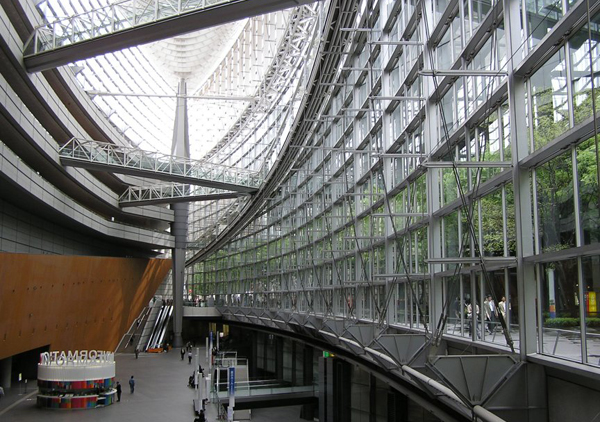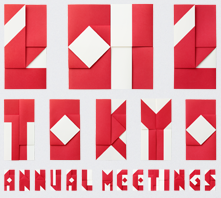The IMF and World Bank meetings in Tokyo
Every three years, the annual meetings of the IMF and World Bank are held away from the two organizations’ Washington D.C. Headquarters and this year, it is the turn of Tokyo to host. The meetings are a forum for international cooperation which are held ‘to discuss international economic and financial developments and policies’.
Between October 9 and 12, around 20,000 delegates from 188 countries are expected to attend the meetings, which are mainly being held at the Tokyo International Forum, pictured above.
As the aim is to strengthen inclusive economic growth and help countries overcome poverty, the venue is usually a developing nation. The 2012 meetings had initially been planned to take place in Egypt but, after developments in the region in early 2011, the organisers felt that a move was necessary and Japan stepped in. Offering its services at a time when itself in such early stages of recovery from catastrophic earthquake and tsunami was a brave move and one the city of Tokyo, and Japan as a whole, wants to capitalise on.
Hiroshi Naka, secretary general of the Japan Secretariat for the 2012 annual meetings of the IMF and the World Bank Group, speaks eagerly of what the meetings can do for Japan and why he is glad Tokyo is playing host.
Selling the merits of Tokyo and showcasing what it has to offer might sound easy – here we are in one of the most exciting cities in one of the most advanced countries in the world which has a history and culture well known to almost everyone.
Naka, who with his staff seems to have taken the challenge in his stride, explains that there are four pillars to the project of doing justice to the choice of Tokyo as host city. The first time the meetings were held here was in 1964, the same year that Tokyo last hosted the Olympic Games. Those meetings – brought to Japan by then finance minister and future prime minister, Kakuei Tanaka – were, Naka has said, “an opportunity to promote Japan to the world and one of the driving forces behind Japan’s post-war new start.”
In 2012, there are new challenges but also new opportunities. Selling Japan to the world is still a priority, of course: “Kakuei Tanaka told young staff of the Ministry of Finance in 1964 that the annual meetings were superior to more than 100 international trade fairs,” Naka says, “We hope to get a similar benefit this year.” Although he is keen to stress that the benefits are not only financial.
The take up of offers to arrange factory visits to showcase Japan’s industry to the world has been high. “That’s good news for Japanese people because sometimes they lose confidence in their technological advancement but now, with so many countries interested, it’s a good opportunity to regain that confidence.”
“Another merit of hosting the meetings in Tokyo, in Japan, is that we can show recovery from the earthquake last year,” Naka says. “As part of that we are going to host a big seminar in Sendai (Miyagi prefecture) with the World Bank, at which we’d like to spread the message to developing countries that they have to mainstream disaster risk management into their development policy.”
As well as passing on lessons learned, Naka says, “we would like to make an intellectual contribution to the world.” There will be a program of seminars, hosted in collaboration with the World Bank and IMF and through these – as well as cultural exhibitions throughout the venues – visitors will find something to take away.
Linking the past and present is a big part of the message about Japanese culture, Naka says, “for example people will learn about how some of the technology the Tokyo Sky Tree uses to mitigate earthquakes comes from the idea of a central pillar inherited from five-tier pagodas.”
The benefits of the meetings go both ways, Naka feels: “I hope visitors and people living here will tell other people coming from abroad what they feel about Japan – both the good and the bad aspects. Everything should be fed back to Japan through media and so on, and that kind of conversation with the public will only help us develop ourselves in the future.”
To find out more about the IMF and World Bank Meetings in Tokyo, have a look at the website, here.










